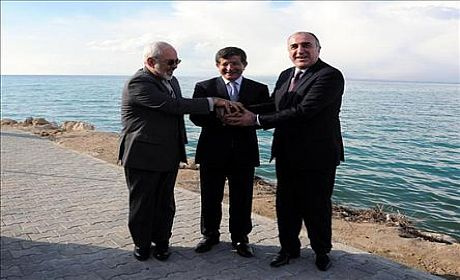Iran, Turkey, Azerbaijan, and the Road Map for Caucasia

On his visit to Turkey, Zarif met and conferred with Elmar Mammadyarov and Ahmet Davutoglu, the Foreign Ministers of Azerbaijan and Turkey. Considering the fact that such trilateral meetings between Iran, Turkey, and Azerbaijan have not often taken place and also considering the created challenges between these three countries, what is the significance of this meeting?
This meeting, which has taken place after almost 16 years, is important from different aspects. There are common interests between Iran, Turkey, and Azerbaijan but during the past few years there have been differences in the area of foreign policy and national security between these three countries. These are not only the differences between Iran and Azerbaijan or the issue of Syria which, for some time, distanced Iran and Turkey. The inclinations of some countries including Armenia in recent years have led Turkey’s foreign policy to be distanced from Azerbaijan. Of course, other issues could be added to these challenges. There have been disputes in Azerbaijan with Turkey’s merchants which have further inflamed these problems. Perhaps these differences are not very significant but they have been highlighted in the foreign policy of these three countries. Therefore, this meeting could be an introduction to the improvement of trilateral relations and impact the Caucasus. I hope that, due to the good atmosphere which existed in these negotiations, great results can be achieved in this trilateral regional cooperation.
In this meeting, Turkey’s Foreign Minister expressed concern over the events in Syria. On the other hand, Azerbaijan accused Iran of interfering in this country. Now, how could Iran remove the concerns of Turkey and Azerbaijan in order to be able to expand relations and cooperation?
Part of these concerns could not, in principle, be removed by Iran, because they are not real. When some countries are faced with internal challenges and are not able to solve them, they attempt to relate them to outside forces. The statements made by Azerbaijani officials are nothing new and this has been a trend which has continued since 30 years ago. Whenever Azerbaijan has been faced with serious problems inside the country, it has suppressed them and attempted to relate them to other countries; sometimes to Russia and most of the time to Iran. But this is not true. That is why no one in the Iranian Foreign Ministry places great importance on this issue. There have only been official statements. The Azerbaijani officials have repeatedly pursued this path. But with regard to the issue of Syria and the statements made by Mr. Davutoglu, I must say that Turkey’s policies in Syria have failed. Its policy was cooperation with the very violent terrorist movements. The US cooperated with Turkey in this regard as well. Meanwhile, Turkey’s foreign policy regarding this very sensitive issue has failed and it feels that it was due to Iran’s firm stance with regard to Syria, thus, it naturally expresses concern about this issue. I believe that this is not very important. The nature of foreign policy particularly in the western style is that, whenever a good and important issue takes place in their foreign policy, they attempt to make it insignificant. For countries like Turkey and Azerbaijan, it is natural that they intend to show the Americans that this trilateral closeness and relations are not very serious and important, but we know that this meeting was very significant.
During the past eight years, Iran’s foreign policy was mainly focused on Latin American countries and less on the Caucasus and the neighboring countries to Iran’s north-western region. The visit made by Dr. Zarif and the trilateral meeting indicate the attention paid by the Foreign Ministry to this region. What opportunities could this region bring for Iran?
Caucasia is one of the most important areas of Iran’s foreign policy. The meaning of political influence in the Caucasus is an assured influence in the Black Sea to the north of the Caucasus and the Caspian Sea. This region is geopolitically significant for Iran because historically this region is very important in future relations between Iran and Europe and the future of oil and energy cooperation in the Caspian Sea and Caucasia. Therefore, this region is very important and unfortunately during the past 8 years, Iran’s foreign policy was not well-defined in its discipline and behavior. Mr. Zarif will hopefully compensate for that.
Caucasia is one of the regions which is under Russia’s influence. Now the deepening of Iran’s relations with the countries of this region including Azerbaijan and trilateral meetings could create concerns for the Russians with regard to Iran’s influence in this region. How could Iran prevent such possible concerns for Russia and at the same time expand its relations and cooperation with the countries of the Caucasus?
It is true that Caucasia is under the influence of Russia’s policies, but the policies of the Islamic Republic of Iran will certainly affect this region and there are useful historical roots in Iran’s influence in this region. One could find Iran’s Islamic civilization in all parts of this country. There have been deep cultural relations between us and Armenia and Georgia especially during the past ten years. I believe that Caucasia is not only under the influence of Russia, but under the influence of Iran as well. Iran and Russia have a common enemy, the US and sometimes Europe, in this region and as Russia is the point of strategic balance against Europe, Iran is the point of strategic balance against the US in this region. These two equations have removed many of the concerns of both sides and increased the tendency to cooperate in this region between us. We have never, during the last twenty years, had serious problems with Russia in this region and I feel that one should not be worried in this regard.

